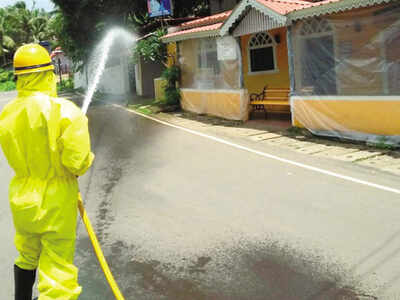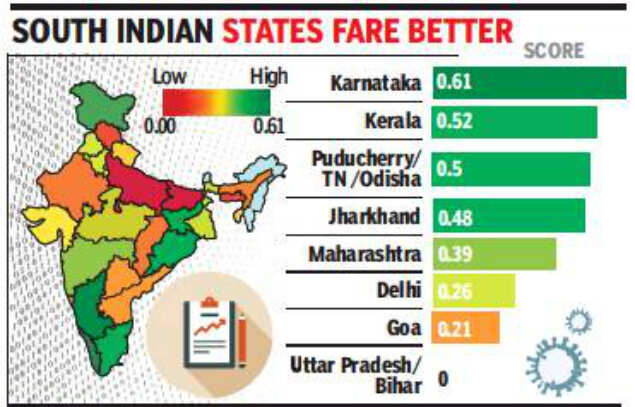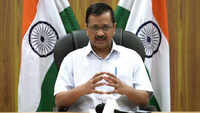
PANAJI: A Stanford University study that assessed the quality of Covid-19 data reported by states in India named Goa as one of the ten worst performers in this category, just behind Chhattisgarh.

Goa, like most states, does not offer a finer look into the Covid-19 cases such as details about sex, age, co-morbidities and travel history. This data, as pointed out in the study, can assist policy makers and the scientific community to frame a stronger response to counter the pandemic.
The study also pointed out the huge disparity across states in reporting Covid-19 data, and said that the lack of a common format makes it difficult to understand the pandemic and coordinate an effective nationwide response. The study also highlights the need for a central agency to monitor and audit the quality of data released by each state.
The authors of the study said that given the months that have gone by since the nationwide lock-down was initiated, state governments had sufficient time to develop a good data reporting system.
Chief minister Pramod Sawant’s position on community transmission, at times at odds with the stand taken by the health minister Vishwajit Rane and his BJP colleagues, has added to the confusion and uncertainty among residents about the spread of the pandemic in the state.
On July 1, just days after stating that community transmission of coronavirus had set in in Goa, Sawant retracted his statement. He went on to say that the “virus is not in the air” in Goa.
The confusion surrounding the deaths of former Congress MLA Jitendra Deshprabhu and the former health minister Dr Suresh Amonkar offers yet another example of Goa’s sketchy Covid-19 reporting. Amonkar passed away while undergoing treatment for Covid-19, but a day after he was cremated, state authorities reported that his sample tested negative for Covid-19.
A similar situation is playing out currently at Goa Medical College (GMC) and Hospital, where Cuncolim MLA Clafasio Dias tested positive for Covid-19 just a few days after he was declared cured and discharged from the dedicated Covid-19 hospital.
Citing these instances, critics have held the view that the state government is under-reporting Covid-19 cases to paint a better picture of the state’s Covid-19 response.
The Stanford study, which has been published in the preprint repository ‘medRxiv’, says that transparent and accessible reporting of Covid-19 data is critical during a pandemic. The study looked at availability of data across 29 states and Union territories, accessibility of the data, finer data points or granularity, and privacy.
Arunachal Pradesh, Dadra and Nagar Haveli and Daman and Diu, Lakshadweep, Manipur, Mizoram, Nagaland and Sikkim were not included in the study as they had too few cases.
The study found that Karnataka, with a score of 0.61, has the best reporting mechanism to disseminate data on a daily basis on Covid-19 cases, followed by Kerala, Odisha, Puducherry and Tamil Nadu. Uttar Pradesh and Bihar have the worst Covid-19 data reporting score (CDRS) at 0. Goa, with a score of 0.21, is slightly below the middle range.
The study, authored by Varun Vasudevan, Abeynaya Gnanasekaran, Varsha Sankar, Siddarth Vasudevan and James Zou, also shows that states are not coordinating or sharing resources while framing a response to the Covid-19 pandemic.
“Coordination among states is particularly important as more people start moving across states in the coming months,” the study states. “The disparate reporting score also reflects inequality in individual access to public health information and privacy protection based on the state of residence.”
“Unified high-quality data reporting also signifies transparency and hence increases public trust in the government. Containment becomes easier when the public is well-informed,” said the authors of the study.
The disparity in CDRS across states shows that at the national level, there is a lack of a unified framework for reporting Covid-19 data, and thus, there is a need for a central agency to monitor or audit the quality of data reporting by states. “Without a unified framework, it is difficult to aggregate data from different states, gain insights from it, and coordinate an effective nationwide response to the pandemic,” said the study.

Goa, like most states, does not offer a finer look into the Covid-19 cases such as details about sex, age, co-morbidities and travel history. This data, as pointed out in the study, can assist policy makers and the scientific community to frame a stronger response to counter the pandemic.
The study also pointed out the huge disparity across states in reporting Covid-19 data, and said that the lack of a common format makes it difficult to understand the pandemic and coordinate an effective nationwide response. The study also highlights the need for a central agency to monitor and audit the quality of data released by each state.
The authors of the study said that given the months that have gone by since the nationwide lock-down was initiated, state governments had sufficient time to develop a good data reporting system.
Chief minister Pramod Sawant’s position on community transmission, at times at odds with the stand taken by the health minister Vishwajit Rane and his BJP colleagues, has added to the confusion and uncertainty among residents about the spread of the pandemic in the state.
On July 1, just days after stating that community transmission of coronavirus had set in in Goa, Sawant retracted his statement. He went on to say that the “virus is not in the air” in Goa.
The confusion surrounding the deaths of former Congress MLA Jitendra Deshprabhu and the former health minister Dr Suresh Amonkar offers yet another example of Goa’s sketchy Covid-19 reporting. Amonkar passed away while undergoing treatment for Covid-19, but a day after he was cremated, state authorities reported that his sample tested negative for Covid-19.
A similar situation is playing out currently at Goa Medical College (GMC) and Hospital, where Cuncolim MLA Clafasio Dias tested positive for Covid-19 just a few days after he was declared cured and discharged from the dedicated Covid-19 hospital.
Citing these instances, critics have held the view that the state government is under-reporting Covid-19 cases to paint a better picture of the state’s Covid-19 response.
The Stanford study, which has been published in the preprint repository ‘medRxiv’, says that transparent and accessible reporting of Covid-19 data is critical during a pandemic. The study looked at availability of data across 29 states and Union territories, accessibility of the data, finer data points or granularity, and privacy.
Arunachal Pradesh, Dadra and Nagar Haveli and Daman and Diu, Lakshadweep, Manipur, Mizoram, Nagaland and Sikkim were not included in the study as they had too few cases.
The study found that Karnataka, with a score of 0.61, has the best reporting mechanism to disseminate data on a daily basis on Covid-19 cases, followed by Kerala, Odisha, Puducherry and Tamil Nadu. Uttar Pradesh and Bihar have the worst Covid-19 data reporting score (CDRS) at 0. Goa, with a score of 0.21, is slightly below the middle range.
The study, authored by Varun Vasudevan, Abeynaya Gnanasekaran, Varsha Sankar, Siddarth Vasudevan and James Zou, also shows that states are not coordinating or sharing resources while framing a response to the Covid-19 pandemic.
“Coordination among states is particularly important as more people start moving across states in the coming months,” the study states. “The disparate reporting score also reflects inequality in individual access to public health information and privacy protection based on the state of residence.”
“Unified high-quality data reporting also signifies transparency and hence increases public trust in the government. Containment becomes easier when the public is well-informed,” said the authors of the study.
The disparity in CDRS across states shows that at the national level, there is a lack of a unified framework for reporting Covid-19 data, and thus, there is a need for a central agency to monitor or audit the quality of data reporting by states. “Without a unified framework, it is difficult to aggregate data from different states, gain insights from it, and coordinate an effective nationwide response to the pandemic,” said the study.
Quick Links
Kerala Coronavirus Helpline NumberHaryana Coronavirus Helpline NumberUP Coronavirus Helpline NumberBareilly NewsBhopal NewsCoronavirus in DelhiCoronavirus in HyderabadCoronavirus in IndiaCoronavirus symptomsCoronavirusRajasthan Coronavirus Helpline NumberAditya ThackerayShiv SenaFire in MumbaiAP Coronavirus Helpline NumberArvind KejriwalJammu Kashmir Coronavirus Helpline NumberSrinagar encounter
Get the app








